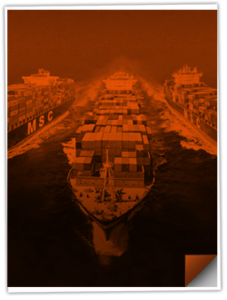Featured Headlines:
FMC Issues Pink Slips for Detention
White House Green Lights 2022 HTS Modifications
BIS Gives Cyber Space to Breathe
LA/LB Doing Well Without the Dwell
The East Feasts on Western Concerns
Madrid Bridge Containers Jump Ship
FMC Issues Pink Slips for Detention
- On Thursday, the US Federal Maritime Commission (FMC) announced that they are investigating detention charges assessed by Wan Hai after the container line allegedly failed to provide a way for their customers to return empty containers.
- Wan Hai has claimed that they do not control appointment systems for returning empty containers and has denied customer requests to waive per diem and detention charges.
- The container line is not alone— MSC and Hapag have also faced similar charges in recent months.
White House Green Lights 2022 HTS Modifications
- Per our earlier announcement, the White House released its official proclamation amending the tariff schedule to reflect the five year update to the World Customs Organization’s (WCO) Harmonized System tariff nomenclature.
- The changes will go into effect beginning Thursday, January 27, 2022— thirty (30) days after the proclamation was published in the Federal Register (FR); click here to view the full FR notice.
- For any questions related to the changes, please contact our Compliance gurus!
BIS Gives Cyber Space to Breathe
- As you may recall, the Bureau of Industry and Security (BIS) published an interim final rule that establishes new controls on certain cybersecurity items for National Security (NS) and Anti-terrorism (AT) reasons. They also created a new License Exception, Authorized Cybersecurity Exports (ACE), that authorizes exports of these items to most destinations except in the circumstances described in that rule back in October 2021.
- The initial ruling included a 45-day period for importers to submit comments, which ended on December 12th, as well as a 90-day delayed effective date of January 19, 2022.
- Based on the feedback from submitted comments, the BIS announced earlier this week that the interim final rule will be delayed by 45-days— to March 7, 2022— to allow the industry sufficient time to comply with all measures and procedures.
- To view the full Federal Register notice, click here.
No Free Fall for Long Haul
- Rates for US long-haul trucking lanes have already increased tremendously in 2022.
- The Los Angeles to Chicago average rate is now $3.66 per mile— a 34% increase over the average 2021 rate for that lane; similarly, New York to Chicago has increased to $3.77 per mile.
- FTL carriers are rejecting 22% of contract moves in favor of spot, and the trade expects that percentage to increase as average per mile costs also climb.
- Current estimates for FTL indicate a 10% increase for the mode in 2022 in the US.
Oakland of the Free
- The port of Oakland has freed property for a dedicated yard to facilitate agricultural exports. According to port officials, the goal “is to provide relief to agricultural exporters facing shortages of export capacity and skyrocketing logistics costs.”
- US agriculture exporters have struggled to find capacity in the last year. The Agriculture Transportation Coalition estimates that as much as 22% of US agriculture foreign sales are lost each month due to limited capacity high rates and excessive demurrage/ detention charges.
- Oakland also called on steamship lines to restore import and export services to and from the port by reinstating transpacific route. Furthermore, the port called for a cessation of the omission of Oakland after ships are delayed in Los Angeles.
US Gateways Making Headway
- Currently, 50% of the top 40 US gateway seaports and rail ramps by volume are reporting normal drayage coverage and booking lead-times; while this may not sound like news, it is the highest percentage on record since February 2021.
- With Omicron breathing down our necks, the unfortunate reality is that the industry broadly expects this number to decline as trucking labor potential is reduced.
- As before, the very largest of US ports and gateways (including Los Angeles, New York, Savannah, Tacoma, and Chicago) still require at least a two-week notification of bookings to secure trucking power.
LA/LB Doing Well Without the Dwell
- The ports of Los Angeles (LA) and Long Beach (LB) announced that the “Container Dwell Fee” would once again be postponed until January 17, 2022.
- The fee was originally set to take effect in November 2021, but has been repeatedly delayed after the ports observed a noticeable clearing of backlogged containers in recent weeks; the number of aging containers on the docks has seen a combined decline of 45% since the introduction of the fee on October 25, 2021.
- Both ports are expected to reassess fee implementation—once again—pending the results of an additional week of data.
Charters Off the Charts
- According to Harper Peterson & Co, the average cost to charter a vessel is nearly 800% higher today than in July 2020; this is no doubt a direct result of dwindling supply and tremendously increased demand from steamship lines (notably Zim Lines).
- Because charter leases are typically quite long in duration, the spike in charter costs will certainly affect the cost structures of the steamship industry through 2024.
- Coupled with an expectation of softening demand, this is another reason carriers are pushing shippers into longer contracts while rate levels are unprecedentedly high.
Sign of the Timeliness Times
- In a stunning sign of the times, the average time between cargo ready dates and departure dates has eclipsed 100 days for both Asia to US and Asia to Europe markets.
- During “normal” pre-pandemic times, the typical time was between 40 and 45 days.
- Manufacturers now face a daunting number of potential production and shipping interruptions, which range from raw materials shortages, trucking scarcity, and prolonged booking delays. This forces US importers to order more products sooner without certainty of domestic sales after arrival.
BNSF Strike Brewing
- Unions that work for the BNSF railway initiated steps to go on strike after the railroad announced a “Hi-Viz” attendance policy.
- The unions allege that the attendance policy will punish workers for taking days off, thereby forcing their members to report to duty without regard for their health status and/or medical condition.
- Instead, unions have asked for more predictable schedules that will make attendance easier and eliminate “forced overtime” for their members.
- The policy is scheduled to take effect on February 1st; conditions of the strike have not yet been established.
Air You Congested Too?
- Airline transit times are lengthening across the globe as the industry battles cargo congestion. Large numbers of ocean to air conversions, Omicron-driven staff shortages, freighter maintenance breaks, and long crew quarantines (especially in Hong Kong and China) have combined to slow airline operations.
- Adding to the transit headwinds, global air cargo capacity is still down 7% since early 2020 as passenger belly space is still considerably less plentiful during the pandemic.
- For the few trade lanes that have increased capacity— including Asia to US— the growth of overall trade far outstrips any capacity upticks. International trade between Asia and the US has grown 32% in two years while air capacity in that trade has only grown 7%.
The East Feasts on Western Concerns
- As we tally the final volumes from Asia for 2021, it is clear that a pattern of lengthy and unreliable transit times to the US West Coast pushed importers to the US East Coast.
- The Port of Virginia achieved a 25.2% increase in import TEUs compared to 2020.
- Similarly, the ports of Mobile (Alabama) and Charleston (South Carolina) registered increases above 19%.
Ningbo Limbo Now BINGO!
- Having learned from the dramatic shutdown in summer 2021, Chinese government officials have largely avoided a crisis in Ningbo after the recent Omicron outbreak. Through thoughtful and strategic planning and testing, the port is operating at close to normal volume levels for both imports and exports.
- With Chinese New Year (CNY) looming, the largest concern for officials at present is local trucking capacity—with current capacity estimates at almost 75%, the stakes could not be higher for the nearly $4B of goods transited through Ningbo each week.
- For now, all eyes are on Tianjin— the primary port for Beijing and the surrounding area— after a recent uptick in Covid cases has prompted a number of shipping restrictions for the port ahead of the 2022 Olympic games.
Madrid Bridge Containers Jump Ship
- On January 7th, the Madrid Bridge, a 13,900 TEU vessel operated by Ocean Network Express (ONE), suffered a container collapse in the North Atlantic while on its EC4 service bound for New York.
- Initial investigations estimated that approximately 60 containers had been lost overboard, with another 80 units damaged; however, the container line said that these numbers could be updated upon further investigation.
- The vessel is now sailing to the US East Coast and is planning to call at the Port of Charleston, where they will complete a detailed damage assessment and discharge affected containers.



